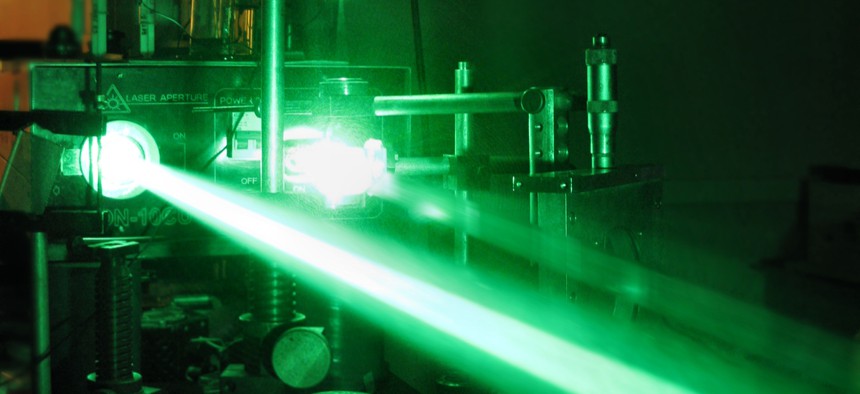Air Force Wants Simulated Wargames to Plan For Lasers, Electro-Magnetic Weapons

Georgy Shafeev/Shutterstock.com
The wargames are meant to teach airmen about these new weapons and help the Air Force develop new tactics and procedures.
Directed energy weapons—i.e., lasers and high-powered electro-magnetic weapons—are fast becoming a reality for troops and the Air Force wants its airmen to be prepared.
The Air Force Research Lab issued a request for information Friday seeking a vendor that can provide wargame modeling and simulations that include how energy weapons are being used today and how they will be used in the near future.
“The purpose of these [military utility] studies is to determine if and how well AFRL/RD and industry technologies can help address warfighter needs and gaps including complementing current fielded technologies and those under development by others,” the notice states.
The Air Force has been working on laser weapons systems, or LaWS, and high powered electro-magnetics, HPEM, for some time, with plans to deploy the technologies on planes by 2020.
Earlier this year, AFRL officials said they successfully shot down “several” missiles using a ground-based laser system. Researchers are working on a smaller, lighter version of the tech—part of a program called the Self-Protect High Energy Laser Demonstrator, or SHiELD—will be mounted on planes for aerial protection as soon as next year.
Through the simulations and wargames, the Air Force hopes to educate airmen on what to expect, as well as learn more from them about how the military should be adjusting to fight with and against these weapons.
“Distributed wargames provide a method of working with warfighters to develop tactics, techniques and procedures—TTPs—and concept of employment—CONEMP—to utilize these AFRL/RD and industry technologies to meet the warfighter needs and gaps,” according to the RFI.
The training program will focus on five areas:
- Modeling: Develop models that run at accelerated speeds while maintaining real-world conditions and results. The models should use artificial intelligence and machine learning to improve over time.
- Simulation: Using those models, the vendor will develop simulations for airmen to train on, including scenarios that enable users to mix and match tools, techniques and resources to different effects.
- Analysis: Analytic tools should collect data and return results on trainee performance, as well as the fidelity of the models and simulations to real-world situations and physics.
- Studies: Participate in studies to further research into directed energy weapons. Those studies will look to “identify what questions need to be answered, what modules are required, what simulations need to be run for specific missions and what analyses need to be performed to answer study questions.”
- Wargames: All this culminates in “distributed wargames” that will be used to determine whether emerging technologies are ready to be transitioned to the battlefield. The contractor will be expected to “facilitate and participate in” these events, as well as manage the upkeeping and development of the platform.
Vendors able to meet these requirements should submit capability statements to AFRL by mail by Aug. 19. All responses should be unclassified and any proprietary information should be marked as such.
The solicitation notes that the final deliverables on the contract “may contain Military Critical Technology List information whose export is restricted. … Therefore, only offerors who are certified by the Defense Logistics Information Services may submit statements of capability.”






